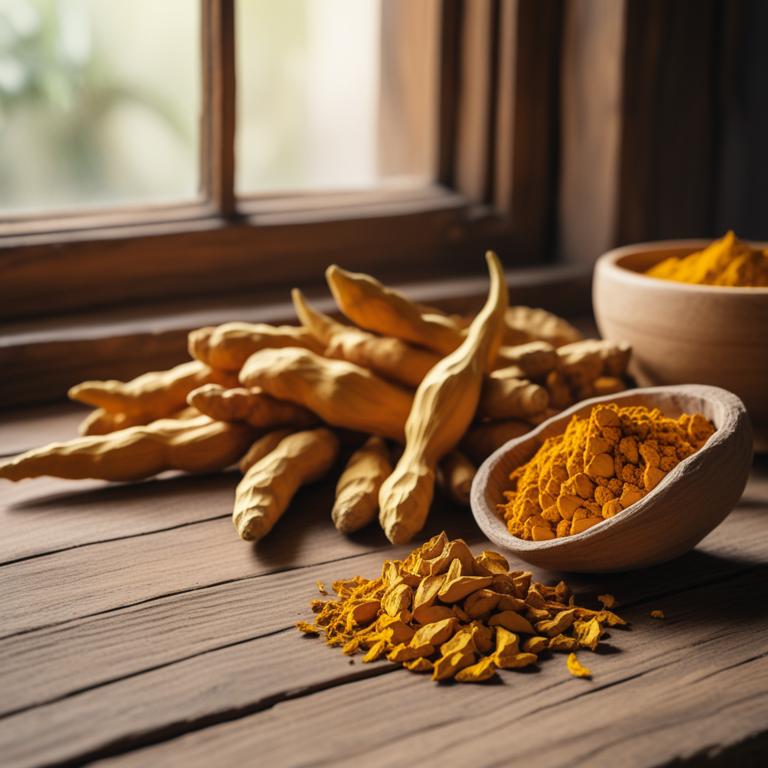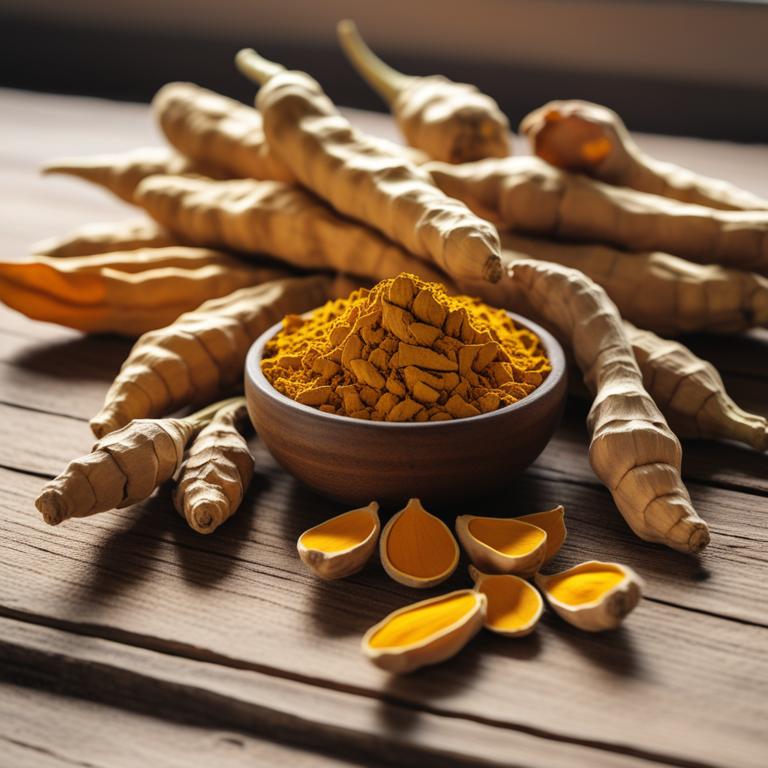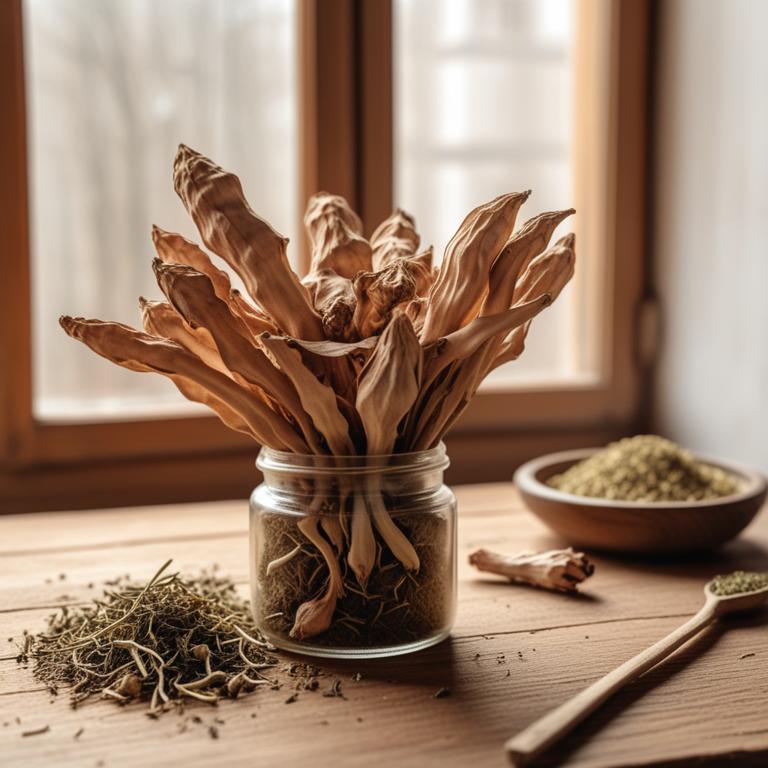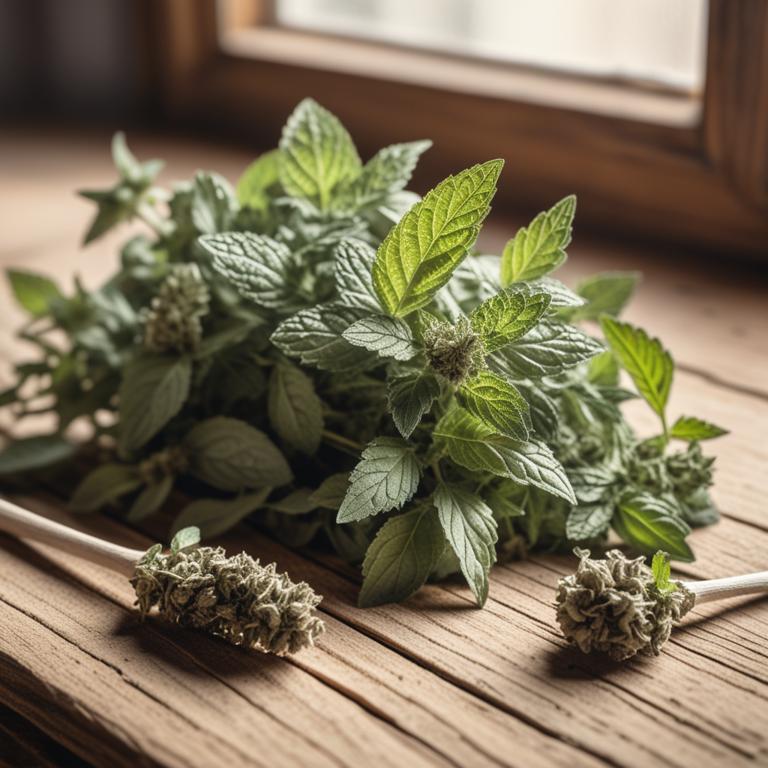Updated: Dec 1, 2024
Inflammatory Bowel Disease: Exploring Causes, Medicinal Herbs, and Herbal Supplements

Inflammatory bowel disease (IBD) is a group of conditions that cause inflammation in the digestive tract, leading to painful symptoms like diarrhea, abdominal cramps, and bloody stools.
Living with IBD can be challenging, making everyday activities like eating and socializing difficult. The exact cause of IBD is not fully understood, but it's believed to be a combination of genetic and environmental factors, such as an imbalance of gut bacteria and an overactive immune response. Herbal remedies have been used for centuries to help manage IBD symptoms. Certain herbs, like turmeric and ginger, have anti-inflammatory properties that can help reduce inflammation and pain in the digestive tract. Peppermint oil and fennel seeds have been shown to relax the muscles in the digestive tract, easing cramps and spasms.
Licorice root has been used to soothe and protect the mucous membranes in the digestive tract, reducing inflammation and promoting healing. These healing herbs can be consumed in various forms, such as teas, capsules, or tinctures. Drinking a warm cup of peppermint tea or ginger tea before meals can help ease digestion and reduce symptoms. Some herbal preparations, like licorice root tinctures, can be added to food or drinks to provide a boost of anti-inflammatory compounds. Fennel seeds can be brewed into a tea or added to meals to help relax the digestive tract muscles.
While these herbal remedies may not cure IBD, they can provide relief from symptoms and improve quality of life.
Table of Contents
- What factors contribute to the development of inflammatory bowel disease?
- What benefits can be expected from the use of herbs in inflammatory bowel disease?
- What medicinal herbs are most commonly associated with the treatment of inflammatory bowel disease?
- What are the top herbal preparations prescribed for patients with inflammatory bowel disease?
- Are there any herbs that can exacerbate inflammatory bowel disease?
- FAQ
What factors contribute to the development of inflammatory bowel disease?
The main causes of inflammatory bowel disease are complex and not fully understood, but research has identified several key factors that contribute to its development.
Genetics play a significant role, with people having a family history of the disease being more likely to develop it. This suggests that genetic mutations can increase the risk of developing inflammatory bowel disease. Smoking is another major contributor, as it can reduce the blood flow to the intestines, leading to inflammation and damage.
Infections, particularly those caused by bacteria and viruses, can trigger the onset of the disease in people who are already at risk. Stress is also a known trigger, as it can cause inflammation in the body and exacerbate existing conditions. Diet is another important factor, with some foods, such as gluten and dairy, being potential triggers for people with specific conditions like celiac disease or lactose intolerance.
Medications, such as nonsteroidal anti-inflammatory drugs (NSAIDs) and certain antibiotics, can also cause inflammation in the intestines and lead to the development of inflammatory bowel disease.
What benefits can be expected from the use of herbs in inflammatory bowel disease?
Herbs have been used for centuries to help manage symptoms of inflammatory bowel disease (IBD).
One of the main benefits is that they can help reduce inflammation and swelling in the digestive tract, which can be a major source of pain and discomfort. These herbs can also help to soothe and calm the digestive system, making it easier to eat and digest food without experiencing symptoms like bloating, cramps, and diarrhea.
Additionally, some herbs have been shown to have anti-bacterial properties, which can help to get rid of the underlying infection that can cause IBD symptoms. By reducing inflammation and improving the digestive system's ability to function properly, herbs can help to improve a person's quality of life and reduce their reliance on prescription medications.
They can also help to promote a healthy gut microbiome, which is essential for a strong immune system and overall well-being.
What medicinal herbs are most commonly associated with the treatment of inflammatory bowel disease?

Herbs have been used for centuries to help manage symptoms of inflammatory bowel disease (IBD), such as Crohn's disease and ulcerative colitis.
One of the most effective herbs is Turmeric, or Curcuma longa, which contains a powerful compound called curcumin. Curcumin has strong anti-inflammatory and antioxidant properties that can help reduce inflammation and pain in the digestive tract. Ginger, or Zingiber officinale, is another herb that can help alleviate IBD symptoms. Its anti-inflammatory compounds can help reduce swelling and pain in the digestive tract, making it easier to eat and digest food. Ginger also has natural digestive enzymes that can help break down food and reduce nausea and bloating. Aloe vera, or Aloe barbadensis, is a soothing herb that can help calm the digestive tract and reduce inflammation. Its gel-like substance can be applied topically to the skin to reduce inflammation and pain, and it can also be taken orally to help soothe the digestive tract.
Aloe vera's anti-inflammatory properties can help reduce symptoms of IBD, such as diarrhea and abdominal pain. Licorice root, or Glycyrrhiza glabra, is an herb that has been used for centuries to treat digestive issues, including IBD. Its anti-inflammatory compounds can help reduce inflammation and pain in the digestive tract, making it easier to eat and digest food. Licorice root also has natural digestive enzymes that can help break down food and reduce nausea and bloating. Cinchona officinalis, or the cinchona tree, is a plant that has been used for centuries to treat digestive issues, including IBD. Its bark contains a compound called quinine, which has anti-inflammatory properties that can help reduce inflammation and pain in the digestive tract. Quinine can also help reduce symptoms of IBD, such as diarrhea and abdominal pain. These herbs can be used alone or in combination with each other to help manage IBD symptoms.
However, it's essential to consult with a healthcare professional before using any herbal remedies, as they can interact with medications or have side effects.
What are the top herbal preparations prescribed for patients with inflammatory bowel disease?

Herbal preparations can be a helpful addition to treating inflammatory bowel disease (IBD).
For example, taking capsules of turmeric, which contains a compound called curcumin, can help reduce inflammation in the gut. Curcumin has powerful anti-inflammatory properties that can block the production of chemicals that cause inflammation, which can help ease symptoms of IBD like abdominal pain and diarrhea. Another way to use herbal preparations for IBD is by making a decoction of marshmallow root. A decoction is a type of liquid herbal remedy that's made by steeping the root in hot water, then straining it. Marshmallow root has anti-inflammatory properties that can soothe and protect the mucous membranes in the gut, which can help reduce inflammation and irritation. Herbal tinctures, which are concentrated liquid extracts of herbs, can also be beneficial for IBD. For instance, a tincture of peppermint can help relax the muscles in the digestive tract and reduce symptoms of IBD like bloating and cramps.
Peppermint tincture can be added to water or taken directly under the tongue. Applying a cream or salve made from herbs like aloe vera or chamomile to the skin can also be helpful for IBD. These herbs have anti-inflammatory and soothing properties that can calm irritated skin and reduce inflammation. This can be especially helpful for people with IBD who experience skin symptoms like rashes or itching. Finally, drinking tea made from herbs like ginger or licorice root can also be beneficial for IBD. These herbs have anti-inflammatory properties that can help reduce inflammation and ease symptoms of IBD like nausea and vomiting. Ginger tea, in particular, can help stimulate digestion and reduce nausea.
It's worth noting that while herbal preparations can be helpful for IBD, they should be used under the guidance of a healthcare professional, as some herbs can interact with medications or worsen certain symptoms.
Additional Resources:
- 10 herbal tinctures for inflammatory bowel disease
- 8 herbal creams for inflammatory bowel disease
- 10 herbal teas for inflammatory bowel disease
Are there any herbs that can exacerbate inflammatory bowel disease?
If you have inflammatory bowel disease, it's essential to be cautious with certain herbs.
Ginkgo biloba, for example, can increase bleeding and worsen bleeding disorders, which might be a concern for people with inflammatory bowel disease. Valeriana officinalis, commonly used to calm nerves, can slow down digestion and worsen symptoms of IBD.
Cassia auriculata, also known as the 'sweet acacia', may exacerbate digestive issues by irritating the stomach lining. Ephedra sinica, often used for weight loss, can cause dehydration and worsen diarrhea, which is a common symptom of IBD. Rauvolfia serpentina, traditionally used to treat high blood pressure, can cause stomach upset, nausea, and even diarrhea, which can be problematic for people with digestive issues like IBD.
When you have inflammatory bowel disease, it's crucial to talk to your doctor before trying any herbal remedies.
FAQ
Are there any specific herbs that can prevent inflammatory bowel disease?
Turmeric, a common spice, contains curcumin, which has anti-inflammatory properties that may help prevent inflammatory bowel disease.
Ginger, another popular herb, has also been shown to reduce inflammation in the digestive tract.
These natural compounds may provide relief and support for people affected by this condition.
Is it safe to use herbal remedies for inflammatory bowel disease during pregnancy?
Using herbal remedies during pregnancy with inflammatory bowel disease can be a concern.
Some herbs may affect the baby's growth or cause birth defects. It's also possible for the remedy to interact with other medications or worsen symptoms. It's essential to weigh the potential benefits against the possible risks.
More research is needed to fully understand the effects of herbal remedies during pregnancy.
Are there any herbs that can reduce the frequency of inflammatory bowel disease?
Turmeric contains a compound called curcumin, which has been shown to reduce inflammation in the body.
Ginger also has anti-inflammatory properties that may help alleviate symptoms of inflammatory bowel disease.
Some research suggests that consuming these herbs may help decrease the frequency and severity of flare-ups, but more studies are needed to confirm their effectiveness.
Related Articles

Inflammatory Bowel Disease: Exploring Causes, Medicinal Herbs, and Herbal Supplements

Stomach Cramps: Effective Herbal Preparations and Medicinal Plants

Causes and Herbal Preparations of Viral Hepatitis: A Comprehensive Guide

Hemorrhoids Causes, Symptoms, and Natural Herbal Preparations

Stomach Pain Relief: Understanding Causes and Using Herbal Preparations






